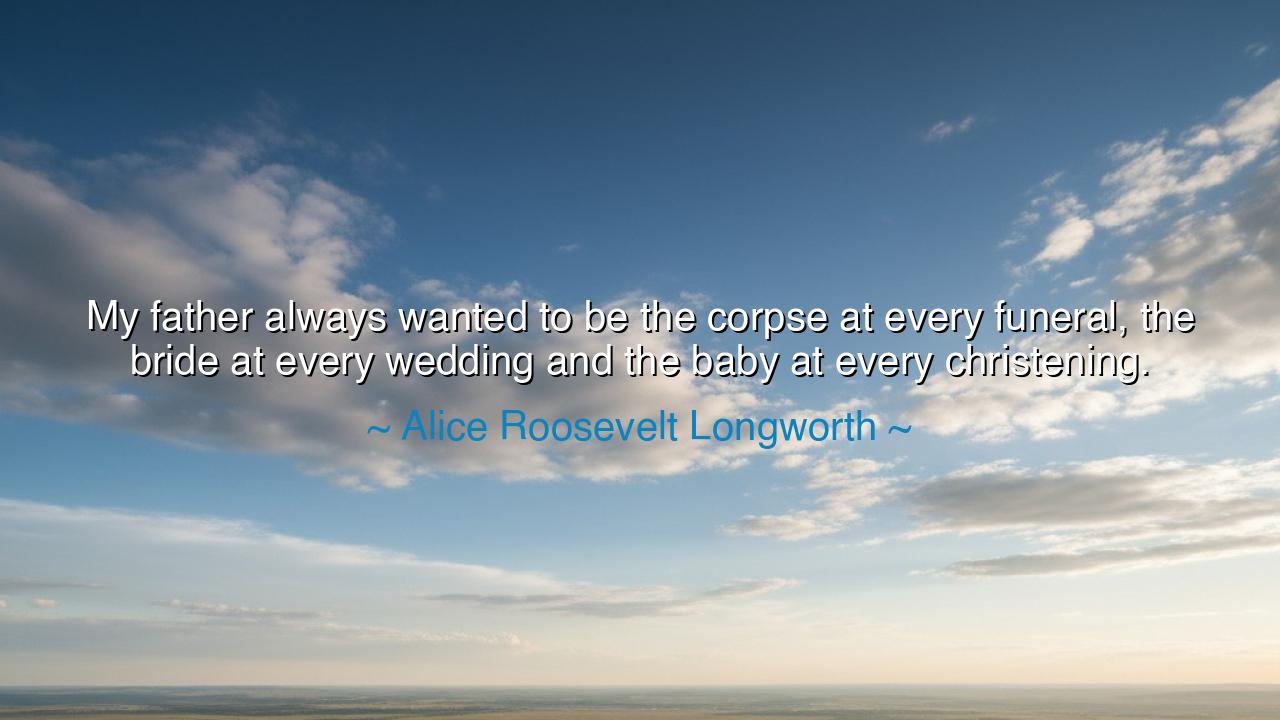
My father always wanted to be the corpse at every funeral, the
My father always wanted to be the corpse at every funeral, the bride at every wedding and the baby at every christening.






Hearken, children of distant ages, to the spirited words of Alice Roosevelt Longworth, who observed with wit and clarity: “My father always wanted to be the corpse at every funeral, the bride at every wedding and the baby at every christening.” In this vivid declaration lies the portrait of a soul consumed by curiosity, mischief, and the desire to witness life from every possible vantage. Here is a man who refuses to remain merely observer, who longs to embody every role, to traverse the entire spectrum of human experience, from grief to joy, from innocence to ceremonial splendor.
Longworth’s words reveal the ironic hunger of the human spirit: the desire to participate fully in the rites and rituals of society, not from necessity, but from the sheer zest of life. The funeral, the wedding, and the christening are each a threshold, moments laden with emotional gravity. Yet her father’s wish to become the corpse, the bride, and the baby speaks of a playful rebellion against the ordinary: he would not be confined by the roles assigned by custom, but would inhabit them with a gleeful audacity that blurs the lines between participant and observer.
Consider the legendary Benjamin Franklin, who moved through life with a similar delight in inhabiting every role society offered. He attended debates, dinners, assemblies, and scientific demonstrations with equal vigor, often inserting himself in ways that provoked thought and laughter alike. Like Longworth’s father, Franklin reveled in the multiplicity of human existence, finding in each event a new lens through which to view the world and engage the hearts of men and women.
Yet beneath the humor lies a subtle teaching: to live fully, one must approach life with courage and imagination, daring to explore even the most humbling or unusual roles. There is wisdom in seeing the world through the eyes of the dead, the newly wed, or the innocent infant. By doing so, one cultivates empathy, humor, and a profound understanding of the human condition. Longworth’s observation is thus both playful and instructive, revealing the power of presence, of fully inhabiting the moments that define communal life.
Let this lesson echo through the corridors of time: life is a tapestry of rituals, roles, and rites, and to embrace them fully is to engage with the richness of existence. Those who, like Longworth’s father, approach life with audacity and imagination teach us that joy and insight come not merely from observation, but from daring to step into the heart of the ceremony itself.
Carry this wisdom, children of generations yet unborn: participate boldly, inhabit fully, and let the humor and wonder of life guide your passage through every threshold. For it is in the living of many roles, with honesty, curiosity, and delight, that the soul discovers its vastest horizon.






AAdministratorAdministrator
Welcome, honored guests. Please leave a comment, we will respond soon